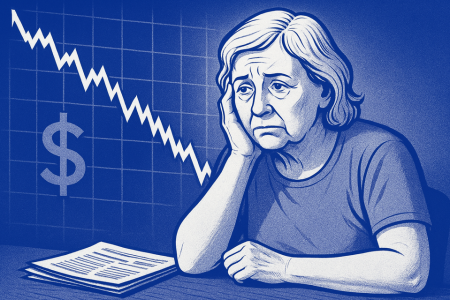Money, Markets, and Mortality: What you need to sort out this financial year
- Replies 0
Noel Whittaker is the author of Wills, Death & Taxes Made Simple and numerous other books on personal finance. Email: [email protected]
Welcome to a new financial year.
Once again, we've lived through an eventful stretch, full of bold predictions about what might happen if Donald Trump returned to the White House. My inbox was flooded with questions: ‘Should I sell everything? Will the markets collapse?’
But my answer never changed. If you hold a well-structured share portfolio, the smart play is to stay the course. Long-term investing means riding out the inevitable turbulence.
And we certainly got some turbulence.
In early April 2025, global markets took a dramatic turn. On 2 April, President Trump announced sweeping tariffs, triggering what’s now called the ‘Trump Thump’: a historic two-day plunge in which the S&P 500 fell 10.5%, wiping out over $3 trillion in value.

Global equities experienced a sharp two-day decline following new U.S. tariff announcements. Source: Seniors Discount Club
But by 9 April, the US administration had paused the tariff rollout, sparking a powerful rebound. Major indices posted their biggest gains in years, with the S&P 500 back in positive territory by 13 May. That rollercoaster time reminded us just how sensitive markets are to political shocks—and why staying informed matters.
There’s no doubt markets—especially overseas—are volatile, with wild price swings becoming the norm.
Two key drivers are behind it. First, traders chasing quick profits jump in and out, fuelling the noise. Second, investor psychology kicks in: everyday people reacting emotionally to headlines. One of the great benefits of shares is their liquidity; you can sell quickly if needed.
But liquidity is a double-edged sword – it makes markets more jumpy. Traders play their games, while mums and dads panic and bail out – often at the worst possible time.
The start of a new financial year is the perfect time to take stock and set goals for improvement. Start by listing your assets and liabilities, because the best map is useless if you don’t know where you are. That simple exercise often shows exactly where to focus.
If you’ve got a housing loan, ask yourself: could you shop around for a better rate? It’s worth doing, especially if you have strong equity in your home. But if your equity is under 20%, don’t bother; lender’s mortgage insurance (which isn’t transferable) will most likely kill the deal.
If you're 50 or over, your goal should be to have your mortgage paid off, or at least well under control, by the time you retire.
The most effective strategy is to maximise your concessional super contributions, now capped at $30,000 a year. That includes what your employer pays—so if they’re putting in $12,000, you can top up with another $18,000. It’s far better than making extra mortgage repayments, because those come from after-tax dollars, whereas super contributions are pre-tax and tax-deductible. When you retire, you can pull a lump sum out of super, tax-free, to pay your mortgage out in full.
Or, alternatively, withdraw enough to cover the mortgage payments and let the superannuation balance grow. This would be particularly effective if the interest rate on your loan was much less than the returns coming from your super.

Withdrawing only the mortgage payments can allow the super balance to keep compounding. Source: Drazen Zigic / Freepik
For senior Australians, another essential question is: ‘Where do I want to be living in a few years?’ As we age, we are all likely to need some help. Is your current home suitable if your health or mobility changes? If you love the area, you might be able to modify the home and stay put. But for many—especially those in big, older houses with rising maintenance costs—downsizing may be the smarter long-term option. If you choose that option, make sure you research all the costs involved, including stamp duty.
If you are on the age pension, you also need to consider the impact on your pension if you move from a more expensive home to a cheaper one.
While you’re at it, make sure you’ve got an enduring power of attorney and, if needed, an advance health directive. It’s amazing how many people never get around to completing these essential documents, or reviewing them, and the consequences can be dreadful if there’s been significant changes since it was last done.
Another big one is estate planning. When was the last time you checked your will? If you care what happens to your family and loved ones when you leave them behind, make sure this too is updated to account for births, deaths, marriages, separations and significant changes in assets and net worth.
And most importantly, let your family know these documents exist, and exactly where to find them when the time comes.
About the author: Noel Whittaker, AM, is the author of Wills, death & taxes made simple and numerous other books on personal finance. An international bestselling author, finance and investment expert, radio broadcaster, newspaper columnist and public speaker, Noel Whittaker is one of the world’s foremost authorities on personal finance. Connect via Twitter or email ([email protected]). You can shop his personal finance books here.
Advice given in this article is general in nature and is not intended to influence readers’ decisions about investing or financial products. Always seek professional advice that takes into account your personal circumstances before making any financial decisions. The views expressed in this publication are those of the author.






